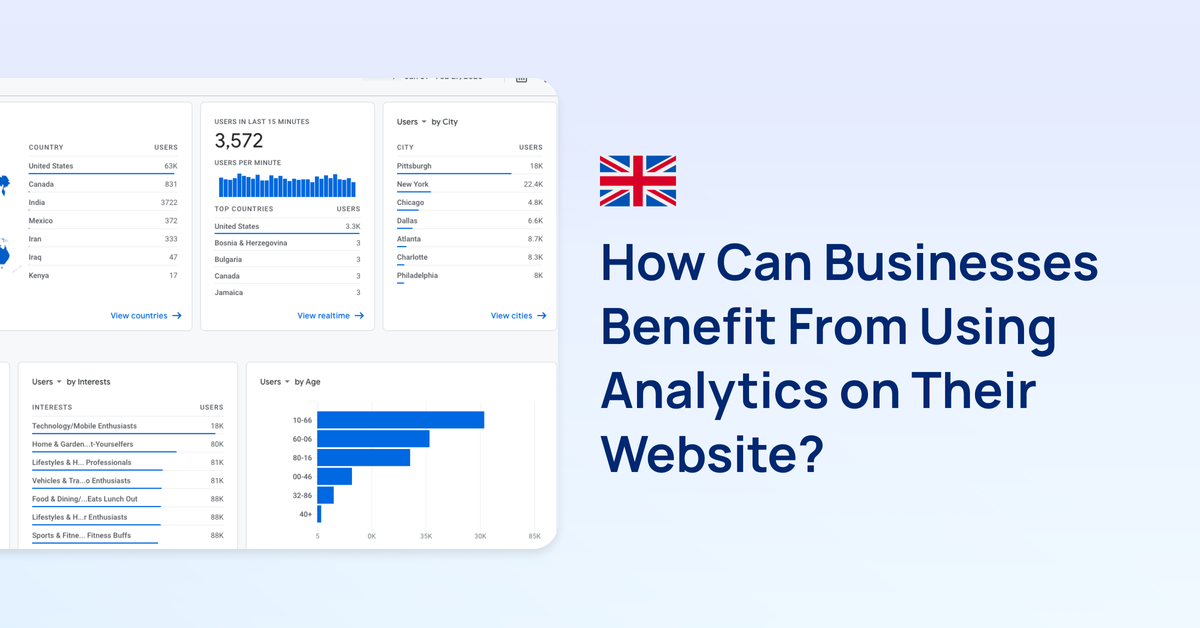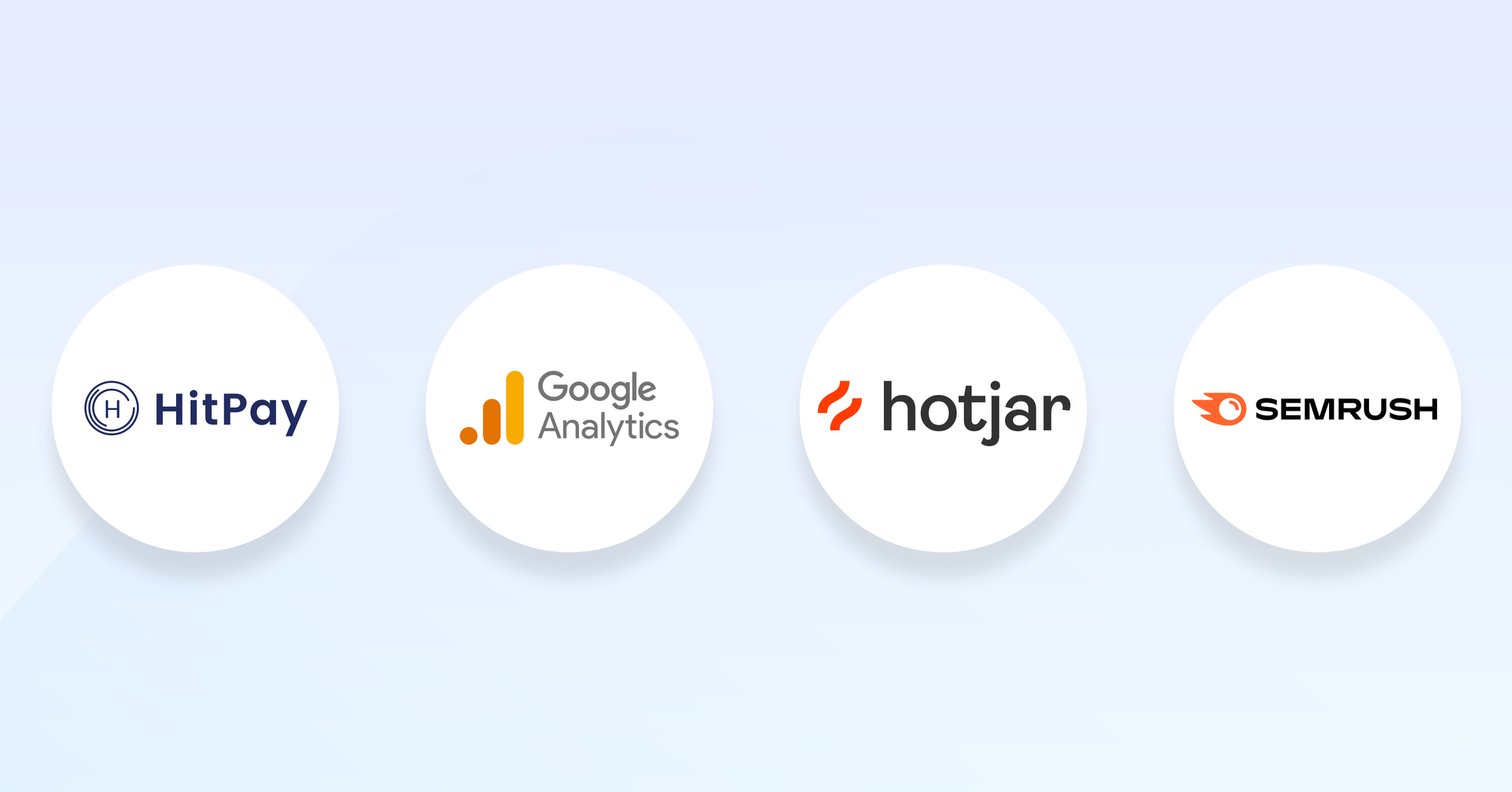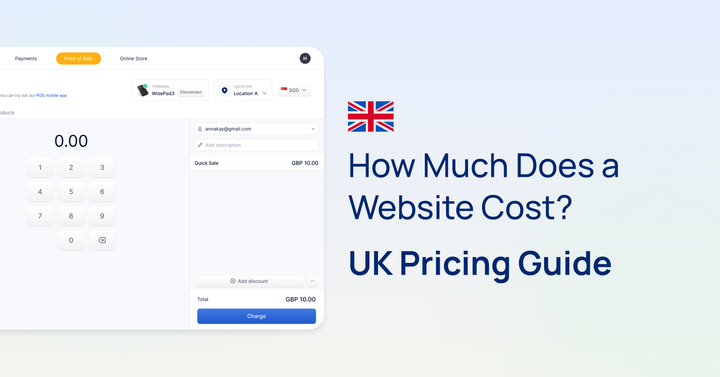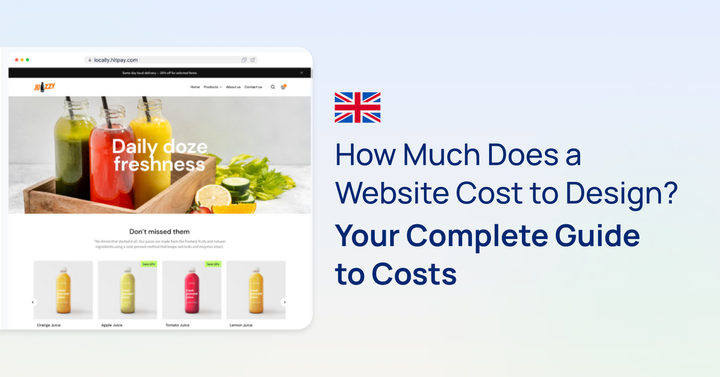How Can Businesses Benefit From Using Analytics on Their Website?
Learn how website analytics can enhance business growth by providing insights into user behaviour, optimising site performance, improving conversion rates, and refining marketing strategies for better

Businesses of all sizes can greatly benefit from using analytics on their websites. Website analytics provide valuable insights into user behaviour, such as where visitors come from, what they do on the site, and which content they engage with the most. By understanding these patterns, businesses can make informed decisions to improve their website’s performance and enhance the user experience.
For businesses using HitPay, an all-in-one payment platform trusted by over 20,000 companies worldwide, website analytics can also help optimise payment processes and increase customer conversions.
In this article, we’ll explore how businesses can effectively use website analytics to boost their online presence, drive growth, and achieve their goals.
Key Takeaways
- Analytics provide insights into user behaviour and preferences.
- Data-driven decisions are crucial for optimising website performance.
- Leveraging website analytics can enhance user experience.
- Improved conversion rates lead to increased revenue.
- Understanding traffic sources helps in refining marketing strategies.
Understanding Website Analytics: What They Are and Why Businesses Can Benefit From Them

Website analytics provide valuable insights into how users interact with your site, revealing details like visitor sources, navigation patterns, and content engagement. Analysing this data helps you make informed decisions to enhance your online marketing efforts.
Properly configured analytics allow you to understand user behaviour, improve website performance, and ensure your site meets essential criteria, such as easy navigation, compelling content, and a smooth user experience.
How Website Analytics Can Impact Business Growth and Website Traffic
Website analytics play a crucial role in driving business growth. They allow you to monitor key metrics, identify market trends, and understand user preferences, enabling you to swiftly adapt your marketing strategies to meet customer needs.
Analytics also provide insights into the effectiveness of your marketing efforts, helping you allocate resources more efficiently. By leveraging user data, you can refine your marketing tactics and make data-driven decisions that support your business's growth.
The Basics of Website Analytics: Traffic, Behaviour, and Conversion Data
Understanding basic website analytics is essential for any business looking to enhance its online presence, and choosing the best website builder can be a critical first step in this process. A reliable builder not only provides a solid foundation for tracking these metrics but also offers tools to optimise performance, such as traffic data analysis, user behaviour tracking, and conversion monitoring.
1. Traffic data reveals how many people visit your site and is vital for assessing the effectiveness of your marketing efforts. Understanding where your visitors are coming from, when they are most active, and the overall traffic trends over time can help you optimise your strategies to attract more visitors.
2. Behaviour analytics examines how users interact with your website. Key metrics include page views, session duration, and navigation paths. This data helps you understand which content captures your audience's interest and identifies areas where you can enhance the user experience.
3. Conversion data is critical for measuring whether your business goals are being achieved. It tracks the number of visitors who complete desired actions, such as signing up for a newsletter or making a purchase. By monitoring this data, you can refine your marketing strategies to improve conversion rates and achieve better results.
By getting good at these basics, you can use data to make your digital strategies better. This leads to a better user experience and more successful marketing campaigns.
Key Benefits of Using Website Analytics for Businesses
Website analytics provide valuable insights that help businesses enhance their online presence. These tools enable companies to optimise user engagement, identify the most effective content, and improve conversion rates, leading to better overall performance and growth.
1. Improving Overall User Experience and Website Performance
Website analytics are key to making the user experience better. 88% of internet users are less likely to return to a website after a poor user experience, so understanding and optimising your site’s performance can help you identify and fix pain points that drive visitors away.
By analysing user behaviour, you can make data-driven adjustments to improve site speed, navigation, and content relevance, ensuring a smoother, more engaging experience that encourages visitors to return.
2. Identifying High-Performing Content and Pages
Audience analytics provide valuable insights into which content and pages are resonating most with your visitors. Analysing metrics like page views, time spent on each page, and engagement rates helps you identify the content that effectively captures your audience's attention and keeps them engaged on your site.
This information helps you understand what types of topics, formats, or styles are most appealing to your users.With this knowledge, you can make informed decisions about your future content strategy, focusing on what truly connects with your audience.
3. Understanding Your Audience: Demographics, Interests, and Behaviour
Website analytics provide a wealth of information about your audience, including their demographics (such as age, gender, and location), interests, and online behaviour. Understanding who your visitors are and what they care about enables you to tailor your marketing strategies to better meet their needs and preferences.
Examining metrics such as page views, time spent on each page, and engagement rates allows you to pinpoint which content effectively captures your audience's interest and keeps them on your site. Insights into interests and behaviour reveal what content, products, or services are most appealing to different segments, allowing you to deliver more relevant and engaging experiences.
4. Enhancing Conversion Rates Through Data-Driven Decisions
Analytics provide businesses with the insights needed to make strategic decisions that can greatly boost conversion rates. By analysing user behaviour—such as the most popular landing pages, points where visitors drop off, and overall site navigation—you can pinpoint where potential customers may lose interest or face challenges.
These insights help you optimise your sales funnels, creating a smoother path from the first interaction to the final conversion. For instance, improving landing page clarity, refining the checkout process, or adjusting call-to-action placements can lead to higher engagement. To further improve your site’s performance, you may also want to learn how to check your website ranking and understand how it impacts your overall strategy.
5. Reducing Bounce Rates and Increasing User Engagement
Website analytics are essential for reducing bounce rates and boosting user engagement. A high bounce rate often indicates that visitors leave your site quickly without exploring further, which can signal issues like slow page loading times, irrelevant content, or poor user experience. By analysing data such as the pages with the highest bounce rates and the average time spent on each page, you can pinpoint where improvements are needed.
Understanding user preferences and behaviour—such as which content formats are most popular, which topics generate the most interest, or which navigation paths are most frequently taken—allows you to make targeted adjustments to your site.
How Analytics Can Help Businesses Drive More Sales and Revenue
Using analytics is key to boosting sales. It helps track the customer journey, giving insights into what customers like. This info is vital for making sales funnels better, helping people move from looking to buying easily.
Tracking Customer Journeys and Optimising Sales Funnels
Understanding the customer journey is essential for identifying where potential customers lose interest or drop off before completing a desired action. By tracking these points, you can refine your sales funnels to guide more visitors toward making a purchase.
This involves:
- Mapping customer interactions across different channels to see how they move through your funnel.
- Identifying friction points that prevent conversions, like confusing navigation or lengthy forms.
- Testing different approaches to find the most effective strategies for engaging your audience and driving conversions.
By focusing on these areas, you can enhance user experience, increase conversion rates, and boost sales.
Analytics for Effective Marketing Campaigns and ROI Measurement
Analytics are essential for evaluating the success of your marketing efforts and ensuring a high return on investment (ROI). By tracking campaign performance, you can identify which strategies are most effective and make data-driven decisions about where to allocate your budget.
In fact, organisations that make use of customer behavioural insights outperform their peers by 85 percent in sales growth and more than 25 percent in gross margin.
Key areas to focus on include:
- Monitoring engagement metrics such as click-through rates, social shares, and time spent on landing pages to understand how well your campaigns resonate with your audience.
- Assessing conversion rates relative to campaign costs, allowing you to determine the true effectiveness of each marketing initiative.
- Adapting strategies based on real-time data, which helps you quickly respond to what’s working or not, optimising your campaigns for better performance.
Using these insights, you can continually refine your marketing tactics to maximise impact, reduce waste, and achieve the best possible ROI.
Website Analytics for Better Decision-Making

Website analytics are essential for making informed business decisions. They enable companies to set clear goals and measure how effectively those goals are being met, ensuring that every strategy aligns with the organisation’s overall objectives.
Setting Goals and KPIs with Website Analytics
Defining specific goals is crucial for evaluating success. Website analytics allow businesses to establish precise, measurable targets that are directly connected to their strategic priorities.
By using analytics to set Key Performance Indicators (KPIs), companies can track progress in real-time and identify areas that may require adjustments. These insights reveal what is working and what isn't, providing a data-driven foundation for making strategic changes and optimising performance.
Using A/B Testing and Split Testing for Continuous Improvement
A/B testing is a powerful tool for improving marketing. 60% of large companies found AB testing helpful in increasing their growth and sales and reducing their website’s bounce rate. It compares different webpages or campaigns to see what works best. This helps boost user engagement and improves website analytics.
Every test offers a chance to learn more about what users like. This knowledge helps tailor business strategies better. It creates a cycle of ongoing improvement.
Popular Website Analytics Tools for Businesses

In today's world, making smart choices with data is key for businesses. Each analytics tool has special features that help you understand your online performance and how users behave. Here are some top tools to think about.
1. HitPay: Payment Solutions with E-Commerce Insights
HitPay offers a complete solution for e-commerce, combining impressive payment processing with an easy-to-use online store builder. The HitPay online store builder is free, requires no coding, and supports unlimited products, customizable themes, and integration with platforms like Shopify and WooCommerce.
Features include inventory management, local and international delivery options, digital goods support, SEO tools, and a mobile-optimised design, helping businesses quickly create a professional and efficient online presence.
2. Google Analytics
Google Analytics is another choice for website analytics, known for its strong data analysis. It tracks how visitors interact with your site, analyses traffic sources, and measures conversions. With Google Analytics, you get insights on how your audience interacts with your content, helping you make better decisions.
3. Hotjar
Hotjar focuses on showing how users act on your website. It uses heatmaps and session recordings to show how people move through your site. This info is key for spotting user experience problems and making your site better for your visitors.
4. SEMrush
SEMrush has a wide range of digital marketing and SEO tools, perfect for businesses wanting to boost their online presence. It offers deep analysis of performance, competitor tracking, and keyword research.
Best Practices for Implementing Website Analytics in Your Business
For businesses looking to use data well, setting up website analytics is key. It's important to set up analytics tools right to get accurate insights. This way, you can make smart decisions based on the data you collect.
How to Set Up and Configure Analytics for Actionable Insights
Begin by selecting the analytics tool that best suits your business needs. Once you’ve chosen the right platform, proper setup is crucial to maximise the value of your data. Follow these steps to configure your analytics effectively:
- Define your Key Performance Indicators (KPIs): Identify the metrics that matter most to your business to ensure your data collection aligns with your strategic goals.
- Implement tracking codes on all relevant pages to capture comprehensive data across your website.
- Use advanced features like event tracking to monitor specific user interactions, such as clicks, downloads, or form submissions.
- Set up goals that directly reflect your business objectives, allowing you to measure success and make data-driven decisions with confidence.
By following these steps, you’ll create a robust analytics foundation that provides actionable insights to drive growth.
Interpreting Data and Turning It Into Actionable Strategies
Website analytics data is only useful when you understand it well. Here's how to get the most from your data:
- Regularly review analytics reports to identify patterns and trends in user behaviour.
- Analyse bounce rates and user engagement metrics to gauge content effectiveness.
- Utilise segmentation to understand different audience behaviours and preferences.
- Establish a routine for updating strategies based on reported data to keep your approach dynamic.
Having a data-driven culture in your company helps your team make decisions based on data. Regular training on analytics tools will help your team use website analytics well. This turns insights into strategies that make a real difference.
Get Started With HitPay's Website Builder
Using website analytics is key to success in today's competitive world. It helps you understand what your users like and need. This knowledge is crucial for growing your business through analytics, making your site better for users and improving your strategies.
Data-driven methods improve your website and help make better decisions. By tracking how customers move through your site and how your marketing works, you can focus on what needs work. This leads to more sales and higher profits.
The digital world keeps changing, and ignoring website analytics can put you behind your competitors. By focusing on analytics, you help your business grow and succeed for the long term. Remember, making smart choices based on data can greatly impact your future growth.
Try HitPay’s Online Website Builder for free today.
If you're a customer who has questions about paying with HitPay, feel free to contact us on our website.
FAQs
How can businesses benefit from using analytics on their website?
Using analytics on a website helps businesses learn about user behaviour and traffic sources. This info helps them make better decisions. It improves website performance, user experience, and marketing strategies. This leads to more revenue and happier customers.
How can website analytics improve user experience?
Analytics help find problems and weak spots on the website. They show how users act, helping to make the site easier to use. This leads to fewer people leaving quickly and more people sticking around and engaging more.
How can analytics help in tailoring marketing strategies?
Analytics give insights into who the audience is and what they like. This helps businesses send messages that hit the mark. It leads to more people paying attention and making purchases.
How does website analytics support data-driven decision-making?
Analytics help by letting businesses set goals and track how they're doing. This way, they can adjust quickly and use data to guide their plans. This leads to better results.



